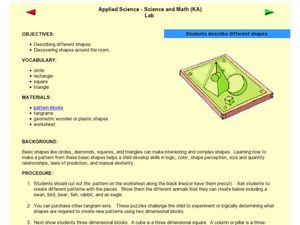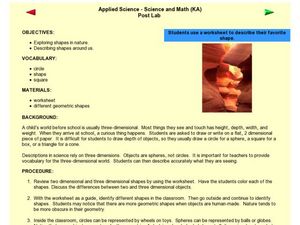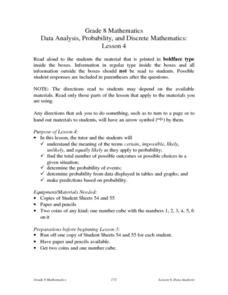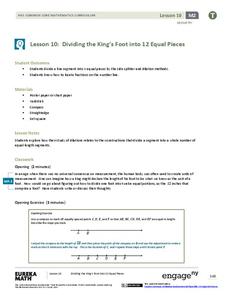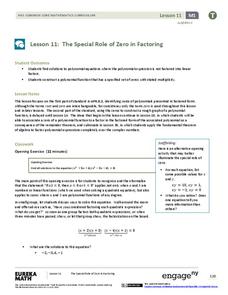Curated OER
Applied Science - Science and Math (K) Lab
In this shape lesson, learners cut out tangram shapes and create different pictures with them. They look at 3-D shapes as well. There is a nice, hands-on component built into this lesson.
Curated OER
Applied Science: Exploring Shapes in Nature
Explore geometry with your young mathematicians! First, have them color in different two-dimensional and three-dimensional shapes. Then take them on a walk around the classroom. Can they identify different shapes using the target...
Education Development Center
Area and Multiplication
Take some intellectual fun and apply it to the concept of multiplying expressions together. A guide models how to break two numbers into an area model to multiply together in pieces similar to FOILing. The rest of the puzzles consist of...
Curated OER
Number and Operations- Using Gift Certificates
Students apply number and operation skills to learn how to spend a gift certificate. In this mathematical reasoning lesson, students use base 10 blocks as money and calculate how much money they have.
Curated OER
Probability and Statistics
Learners reason mathematically as they solve problems dealing with probability of an even occurring. In this probability lesson plan, students differentiate between different rankings of candidates running for leadership. They identify...
Curated OER
Perfumania
High schoolers identify various geometric shapes. Apply the given formulas to determine the volume of these shapes. Design their own container to conform to specifications provided. Use their knowledge of volume formulas and shapes to...
EngageNY
Solutions to Polynomial Equations
Take a step back to Algebra II. The first lesson in a series of 23 asks scholars to remember working with quadratic equations with complex solutions. Pupils apply polynomial identities to complex numbers and work examples that show how...
Curated OER
Data Analysis, Probability, and Discrete Mathematics: Lesson 4
Eighth graders investigate the concepts of probability while performing data analysis. They apply statistical methods in order to measure or predict some possible outcomes. The information is collected and graphed, 8th graders analyze...
Curated OER
Apply Scientific Inquiry and Scientific Habits of Mind
Students review the components of the scientific inquiry method. In groups, they apply this method to various experiments they are given to complete. They also use the correct scientific habits of mind when researching different concepts.
Curated OER
Careers in Mathematics Project
Students use technology (Internet, email) to research mathematics in nonacademic careers in order to increase their awareness and appreciation of mathematics in the "real world."
Curated OER
Mathematics: Prime and Composite Numbers
Sixth graders explore how to apply the commutative property and the rules of divisibility. They examine the difference between prime and composite numbers.
Curated OER
Exercising With the Mathematical Induction Principle
In this math worksheet, students apply the Mathematical Induction Principle. Then they find patterns for the sums. They also read the subsequent proofs for the Induction Principle.
EngageNY
Dividing the King’s Foot into 12 Equal Pieces
Apply, apply, apply! A measurement lesson applies a number of concepts to help learn a new construction. Scholars learn to divide a segment into n equal parts using a method that uses the Side Splitter Theorem and a method that applies...
EngageNY
Newton’s Law of Cooling, Revisited
Does Newton's Law of Cooling have anything to do with apples? Scholars apply Newton's Law of Cooling to solve problems in the 29th installment of a 35-part module. Now that they have knowledge of logarithms, they can determine the decay...
EngageNY
The Distributive Property and the Products of Decimals
Make multiplication of decimals easier by applying the distributive property. Pupils investigate how they can use the distributive property to multiply decimals. After learning the strategy, they work on some practice problems at...
EngageNY
The Power of Algebra—Finding Primes
Banks are responsible for keeping our financial information safe. Mathematics is what allows them to do just that! Pupils learn the math behind the cryptography that banks rely on. Using polynomial identities, learners reproduce the...
EngageNY
Numbers in Exponential Form Raised to a Power
Develop an understanding of the properties of exponents through this series of activities. This third lesson of 15 explores the patterns associated with the power property. Scholars expand the powers before applying the property.
EngageNY
Applications of the Pythagorean Theorem
Begin seeing the world through the lens of geometry! Use the 19th installment in a 25-part module to apply the Pythagorean Theorem to solve real-world problems. Individuals sketch situations resulting in right triangles such as the...
EngageNY
The Division Algorithm—Converting Decimal Division into Whole Number Division Using Mental Math
Make math much simpler with mental math methods. The 16th installment in a series of 21 looks at ways scholars can apply mental math to convert division problems into easier problems with the same quotient. Multiplying or dividing both...
EngageNY
The Special Role of Zero in Factoring
Use everything you know about quadratic equations to solve polynomial equations! Learners apply the Zero Product Property to factor and solve polynomial equations. They make a direct connection to methods they have used with quadratic...
EngageNY
Are All Parabolas Similar?
Congruence and similarity apply to functions as well as polygons. Learners examine the effects of transformations on the shape of parabolas. They determine the transformation(s) that produce similar and congruent functions.
EngageNY
Four Interesting Transformations of Functions (Part 4)
What do you get when you cross piecewise functions with transformations? An engaging lesson! The conclusion of a four-part series on the transformations of functions asks class members to apply transformations to piecewise functions...
EngageNY
Applications of the Pythagorean Theorem
Examine the application of the Pythagorean Theorem in problem-solving questions. Pupils apply the theorem to find lengths when given different scenarios. They finish the 17th installment in an 18-part series by applying the theorem to...
EngageNY
Word Problems Leading to Rational Equations
Show learners how to apply rational equations to the real world. Learners solve problems such as those involving averages and dilution. They write equations to model the situation and then solve them to answer the question — great...


